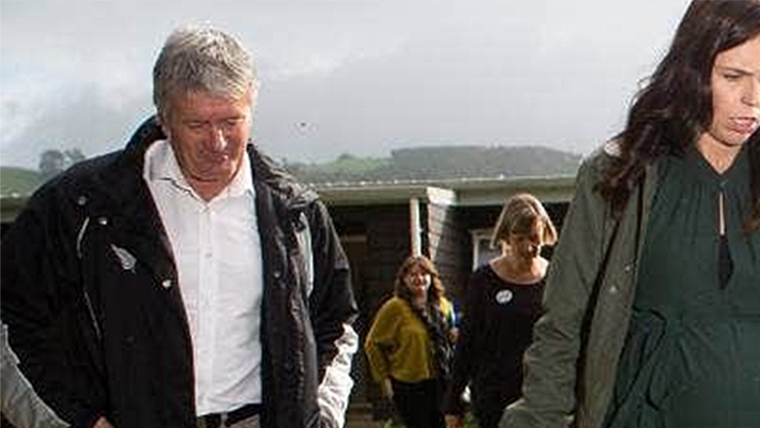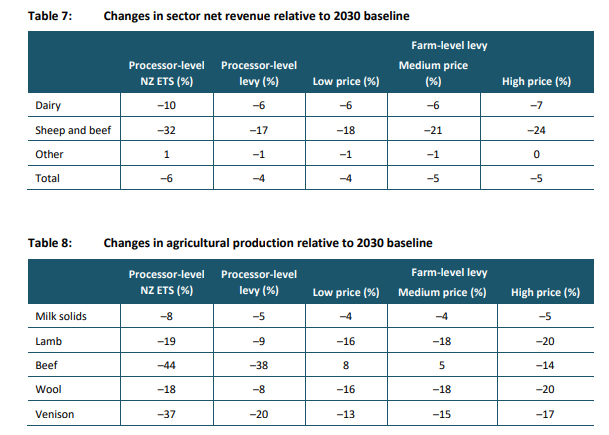
When the Government released their preferred approach to He Waka Eke Noa (HWEN), currently out for consultation, presumably they expected push back in this process. But there does appear to be an element of arrogance in all the ‘consultation’ that government implements with the “Three Waters” debacle being the worst example in the current term of government.
The final response to HWEN will determine how good or bad the current consultation is viewed.
DairyNZ, Fed Farmers and Beef+Lamb NZ have put a joint submissions paper which given that they were among those that ‘constructed’ the original model that went to government perhaps indicates how far the government has moved away from what was initially put forward by the consortium.
One of the things which has been repeated by Damien O’Connor, the Minister of Agriculture, is where the -20% impact on Sheep and Beef farms information has been derived.
In his interview with Interest.co.nz’s Angus Kebbell he clearly states “It doesn't show a 20% reduction in the sheep and beef sector, what it says is a possible reduction in net revenue. And as we know, on any farm revenue can go up and down because of a whole lot of things, environmental changes year to year, prices and everything. So that doesn't mean that those farms go out of production. So, I completely reject the assertion that people have made and extrapolation from the documents. How individual farms deal with that is up to them.”
Perhaps he needs to be better briefed or preferably read his departments documents as they clearly show this assertion in the results from modelling. In the Governments HWEN consultation document in table form it has the following.

The same or similar modelling assertions can be found in other documents such as the September published MPI Document on “Impacts of climate change mitigation policy scenarios on the primary sector” and even earlier in a Tim Denne report published in January “Pricing agricultural GHG emissions: impacts on dairy, sheep & beef and horticulture industries” it alludes to a similar result. When it comes to the changes in land use which are currently threatening sheep and beef farms throughout the country due to the favourable terms overseas investors are still receiving (due to be changed in January 2023 despite caucus recognising the issue back in early 2022) the following passage out of the Tim Denne report is worth considering:
“Regardless of the design of a He Waka Eke Noa pricing system, the high and expected rising price of NZUs in the ETS is expected to provide a strong incentive for land use change from farming to forestry. Exotic planting to gain NZUs will be largely on sheep & beef farms. The effect provides significant reductions (4% or greater reductions in CH4) without any additional pricing system”.
So, while the higher threshold the OIO will be required to impose on potential investors in 2023 may slow down the rate of land use change it is not likely to reverse the trend. It may transpire that agricultural emissions will reduce to what the government aspires to by simply doing nothing.
The consultation process on HWEN is closed in a couple of days and perhaps on a more positive note the government eventually has taken note of some of the criticisms coming from mayors and others over the “Three Waters” proposals. It did also make a rapid knee jerk response to the proposed implementation of GST on Kiwi Saver fees so it has shown it has the ability to change course so we are likely to see some changes made to the draft HWEN proposal it remains to be seen whether they go far enough to satisfy its critics.
One thing the government actions has made me ponder is whether there are some benefits to having a 3-year government term over a 4-year term. I was always of the opinion that the 4-year option won hands done, however, if only for the fact that a shorter term may take some of the wind out of disaffected protest groups the 3-year option may have some merit. Civil unrest and the like are going to gain less traction if the public feel they can use the electoral process to affect change and a fraction of a 3-year term is less time to wait than a 4-year term. That is not to say either of the “Three Waters” or HWEN proposals would lead to unrest but with elections less than a year away it should decrease the chances.
In the meantime perhaps Damien O’Connor could catch-up on some reading.
12 Comments
...So, I completely reject the assertion that people have made and extrapolation from the documents. How individual farms deal with that is up to them.”
Congratulations Mr O'Connor, your cavalier attitude towards New Zealand's largest export earner is / has put agriculture in jeopardy. Yet another stuff up from this incompetent minister and political party.
Time for New Zealand voters to see you for what you are.
Man, there are some farms on the market in Southland, Otago and Canterbury. On realestate.co.nz there are a heap with ‘New’ tags! Where are all the buyers coming from, I wonder.
Begs the question, if growing trees is so much more lucrative than existing farming operations, why sell up and let a foreign corporate make truck loads?
Especially when you can have your pie and eat it , plant enough poplar to meet the ETS minimum , and continue to graze it .
It's odd that the analysis is done in terms of net revenue because that depends upon future price which is notorious difficult to forecast. It would have made more sense to frame the forecast in terms of stock units. Meat prices might significantly increase in a GHG emission constrained future. NZ farmers should be able to leverage their efficiencies and offset potential compared to other competitors.
I'm abit lost to as to whose proposal is whose , and the actual numbers /levies proposed.
The projections are just that , and largely irrelevant , due to the changing weather , and the international ,market flucuations.
So what Levies are the government actually proposing , and what are the farmer groups replying with ?
All this bluster is clouding the issue.
This is happening around the world, dictated by the world elites. Why remove productive farmland that produces a very important commodity - food, essential for life. The world population is now over 8 Billion people who do need food to survive.
There is plenty of food , its just unevenly distributed.
Far more people will starve because climate change will hit poorer worst , than will be fed by 20% of the farmland in NZ.
Its a bit of a strange thing for the world elites to want to dictate , given they probably own most of the worlds fossil fuel production.
That's where I suggest you miss the point, Solar.
Food is energy. There has to be energy in, you cannot create the stuff. and it is all traceable to solar. The problem is, much of it is traceable to very historic solar - we are indeed eating our way through stored sunlight (gas-to-fertiliser-to-grass being a classic pathway). The other way of looking at that, is that we are in overshoot, long-term ecologically.
So you can't say 'there is plenty of food' and in the next breath say ' we must divest ourselves from fossil energy'. Because without the latter, the former is untrue.
But we are moving away from fossil energy, via contention, via per-head demand, and via depletion - which obvious ramifications for global population.
Thanks , I get your point , and agree we definetly need to move away from fossil fuel derived fertiliser. however , I don't believe the drop in food production will be as massive as it is made out. There will be a drop , no doubt about that, but by simply feeding the grain fed to livestock directly to humans, you get by that. That's the distribution point, steak for the rich , vs grain for everyone.
I am sure farmers are currently putting less fert on than normal because of the cost ,we've seen a production drop of around 4 % , mostly put down to the weather.
The domestic emissions reduction targets do not share this burden equally across NZ. The IPCC clearly stated that a biogenic methane reduction of 0.3% per year is equivalent to net zero for CO2 - and most importantly at this reduction there is no further warming. Fossil fuel emitters only need to get to net-zero, and "no additional warming" by 2050, but with a reduction target of 24-47% by 2050 for biogenic methane emissions this target demands agriculture go beyond reduction required to prevent additional warming and instead we are asked to reverse previous warming of other industries. The biogenic methane reduction target is not scientifically based, nor is it equitable with other industries in NZ.
Always crickets when this fact around herd derived methane is pointed out to the anti farming cult.

We welcome your comments below. If you are not already registered, please register to comment
Remember we welcome robust, respectful and insightful debate. We don't welcome abusive or defamatory comments and will de-register those repeatedly making such comments. Our current comment policy is here.